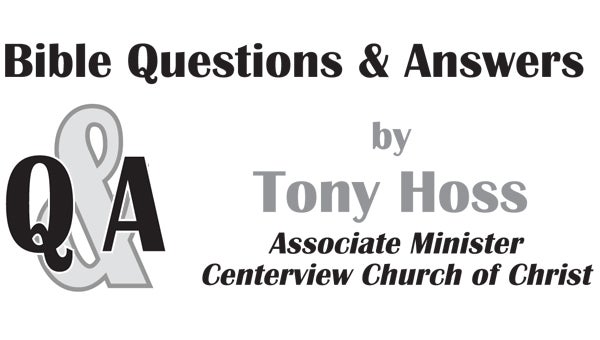Acknowledging God’s lordship in our lives
Published 8:51 am Friday, May 17, 2019
BY HUNTER GREENE
They say the Bible is the greatest story ever told. As good evangelicals, I’m sure most of us would agree. However, I think most of us come to know the Bible stories without ever trying to figure out THE Story of Scripture. We know the Old Testament stories of Adam and Eve, Noah, Abraham, Samson, David, Solomon, and the prophets. We know the New Testament stories of Mary and Joseph, John the Baptist, Jesus, Peter, and Paul. Yet, many of us never try to find the thread that connects all these stories. We start in the Garden of Eden, acknowledge our sin, and then we immediately jump to Jesus, and then Paul’s theology. But perhaps God has given us this Story of Good News (from Genesis to Revelation) to show us that He has been at work to redeem and restore the world since sin broke the relationship with Him.
In the book of Genesis, the author is seemingly trying to make the point that when human beings try to be their own gods and act according to their will without limitations then destruction ensues. Adam and Eve bring the curse. Cain kills Abel. Humanity’s imaginations become nothing but evil, and God sends the flood. However, we see that after this flood God begins to make covenants in order to restore the relationship with His creation. One of these covenants comes in Genesis 12 with Abraham. Verses 1-3 read, “Now the Lord had said unto Abram, Get thee out of thy country, and from thy kindred, and from thy father’s house, unto a land that I will shew thee: And I will make of thee a great nation, and I will bless thee, and make thy name great; and thou shalt be a blessing: And I will bless them that bless thee, and curse him that curseth thee: and in thee shall all families of the earth be blessed.”
Why does God want to make a “nation” from the descendants of Abraham? Furthermore, how is God going to bless all the families of the earth from this new nation? Again, in order to answer these questions, it is essential that we try to find the connecting thread throughout all of Scripture. In other words, what is God trying to do in every book of the Bible?
I want to argue that God is doing the same thing in Genesis 12 as we are instructed to do in Matthew 28:19-20, which reads, “Go ye therefore, and teach all nations, baptizing them in the name of the Father, and of the Son, and of the Holy Ghost: Teaching them to observe all things whatsoever I have commanded you: and, lo, I am with you always, even unto the end of the world. Amen.”
Generally, we read this verse and think that God’s command has always been to GO. However, the Greek reveals to us that GO is not the command. Rather, “Make disciples” is the command. The word “go” in the Greek is actually a participle and would be better translated as “as you are going.” The phrase “make disciples” is a verb in the imperative case. Thus, we should read the Great Commission as, “As you are going on your way, make disciples of all nations.”
Why does this matter? Because from Abraham’s covenant with God to our new covenant through Christ Jesus, our job was never supposed to be about forcibly making people believe what we believe. Rather, our role as God’s people, or what 1 Peter 2:9 calls a “holy nation,” is to bear witness and embody the way of God. God made a nation/people from Abraham so that they would become a shining example of God’s way in the world. They would live differently than the other nations, and in doing so, they would be bringing wholeness back to God’s creation. Ultimately, Jesus becomes the fulfillment of Abraham’s covenant as well as the Law because Jesus did what Abraham and the children of Israel could never do, which was to completely enflesh and live-out the perfect will of God. Jesus was never concerned with convincing people to “get saved” through a sinner’s prayer. Rather, Jesus wanted people to “be saved” by following the will of God for all of creation, which is a holistic salvation that touches every part of our lives (physically, emotionally, spiritually, financially, environmentally, professionally, etc.).
Jesus prays in Matthew 6 for God’s will to be done on earth as it is in God’s Kingdom. The only way this will happen is if we make disciples to also follow God’s way, which we find fully in Christ, but we can’t make disciples of the Kingdom if we aren’t living in the Kingdom ourselves. So my challenge to you this week is to evaluate all the areas of your life where God’s Kingdom is not yet reigning. Where are you still trying to be the lord over your own life? When we confess that Jesus Christ is Lord, we are acknowledging His Lordship over the ways we worship, treat others, spend money, work, rest, and even dispose of trash and pollution. God said in Genesis that His creation was good, and it is through His people that He is restoring that goodness and beauty to every person, animal, and place. This is the Gospel. Live it.
(The Solution Column is provided by Pastor Brandon Young of Harmony Free Will Baptist Church, Hampton, and his associate, Hunter Greene.)



